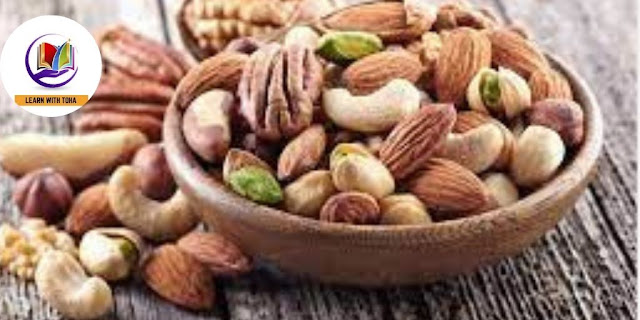Prepared by,
Emrana perveen
9 Amazing health
benefits and Nutrition of peanuts
Peanuts are rich in essential nutrients with various
health benefits. These also are referred to as peanuts,
guar, and earth nuts and are usually eaten roasted or in their raw form. Peanuts
are high in calories and contain 20 amino acids, which are rich in arginine,
which stimulates the immune system. In addition, they are rich in a number of
vitamins, minerals, and plant compounds that are used to treat many ailments.
Peanuts can improve heart health, help with weight loss, prevent gallbladder
and help control blood sugar. In this article, we discuss the potential health
benefits of peanuts, their nutritional profile, and the possible side effects
they cause.
Nutritious profile of peanuts:
According to the US Department of Agriculture, 100 grams of peanuts contain:
- Energy - 567 kcal
- Protein - 25.8 g
- Dietary fiber - 8.5 g
- Carbohydrates - 16.13 g
- Sugar - 4.72 g Iron - 4.5 mg
- Calcium - 92 mg
- Sodium - 18 mg
- Potassium - 705 mg
**Peanuts
are rich in several vitamins and minerals.
1.
Vitamin E,
2.
Vitamin B1 (Thiamine),
3.
Vitamin B3 (Niacin),
4.
Vitamin B9 (Folate),
5.
Biotin,
6.
Copper,
7.
Magnesium,
8.
Manganese and Phosphorus.
These are all necessary to maintain the body’s
metabolism and reduce the risk of several diseases.
Peanuts are rich in monounsaturated and
polyunsaturated fatty acids that reduce the risk of heart disease. They are
also rich in essential plant-based proteins. The recommended daily allowance
(RDA) for adult protein is 56 grams for men and 46 grams for women.
1. Promote and prevent heart health
Eating peanuts protects against coronary heart
disease (CHD). A study conducted by the Harvard School of Public Health found
that peanuts can lower bad cholesterol (LDL) levels. Bad cholesterol leads to
the development of plaque in the blood vessels and peanuts can prevent this. A
study conducted on rats further stated that polyphenol-rich peanut skin extract
can reduce inflammation as a cause of heart disease.
Peanuts have the antioxidant properties of
resveratrol which can help in the fight against heart disease. This is why peanuts
have the same cardioprotective effect as other foods with resveratrol.
A study conducted by Purdue University found that
regular peanut consumption also lowers triglycerides, which further improves
heart disease. This effect can be attributed to the presence of monounsaturated
fatty acids, folate, and magnesium. In addition, a study on rats conducted by
Marmara University (Turkey) found that peanuts increased good cholesterol
levels. However, further studies are needed to understand this effect of peanuts.
2. Prevent gallbladder
Eating peanuts reduces the risk of the gallbladder. A a study conducted by Harvard Medical School and Brigham and Women's Hospital
(Boston) found that eating peanuts can reduce the risk of gallbladder disease.
Men who drink five or more units of nuts (including peanuts) a week have a
lower risk of gallbladder disease.
Women who take five or more units of nuts a week
reduce the risk of cholecystectomy. However, long-term study is needed to
understand the benefit of peanuts.
3. Reduce the risk of cancer
Consumption of high doses of peanuts (including
other nuts) is associated with a reduced risk of colorectal cancer. The is
flavones, resveratrol and phenolic acids found in peanuts have anticancer
properties that can help reduce the risk of cancer.
A study conducted in the Netherlands found that
eating peanuts was also associated with a higher risk of postmenopausal breast
cancer. Peanuts have also been found to prevent gastric and esophageal cancer
in older American adults. When compared, people who did not consume any nuts or
peanut butter had the highest risk of developing this cancer.
But there is a concern about peanuts and cancer.
Peanuts can be contaminated with aflatoxins, a family of toxins produced by
some fungi. These toxins can increase the risk of liver cancer. A study
conducted by the University of Georgia (USA) found that the resveratrol found
in peanuts has powerful antioxidant properties that help reduce the risk of
cancer.
4. Blood Sugar Control
Peanuts or peanut butter in the diet do not raise
blood sugar levels. Taking these with a higher GL diet (such as a bagel or a
glass of juice) can stabilize your blood sugar levels. Peanuts have a GI
(glycemic index) score of 14. Although peanuts have a GI of 14 (on a 100-point
scale), their GL (glycemic load, which tells you what a particular food will do
to your sugar level) is correct. That's why the American Diabetes Association
names peanuts as a diabetes superfood. The fiber in peanuts also helps lower
blood glucose levels. They contain magnesium and other healthy oils that play a
role in this.
A study conducted by the Federal University of
Vicosia (Brazil) on obese women found that eating peanut butter or peanut
butter right in the morning can control blood sugar levels throughout the day.
Another study, conducted by the Harvard School of Public Health, found that
high intake of peanuts and peanut butter helped reduce the risk of type 2
diabetes in women.
Additionally, a daily diet rich in peanuts over 24
weeks can improve the health parameters of patients with type 2 diabetes. The
rich nutritional profile of peanuts is responsible for this, which includes
monounsaturated fat, fiber, arginine, niacin, folate and vitamin E.
5. Erectile dysfunction
Peanuts are rich in arginine, an important
aminoalkanoic acid. Arginine has been extensively studied as a possible
treatment for erectile dysfunction.
Further research is needed to determine if arginine
alone can help treat erectile dysfunction. However, studies confirm that oral
administration of this amino acid mixed with an herbal supplement can treat
erectile dysfunction.
6. Antioxidant properties
Peanuts are rich in plant compounds and
antioxidants. Most of these compounds are found in peanut skin which should be
eaten raw to get all its benefits. Plant compounds that are readily available
in peanuts include resveratrol, vatic acid, and phytosterols, which help impair
the absorption of cholesterol, is flavones, and phytic acid found in plant
seeds.
7. Promote skin health
According to the Vice-Chancellor, eating peanuts can
protect your skin from sunburn and damage. The vitamin E, magnesium, and zinc
found in peanuts can fight bacteria and brighten your skin. The antioxidant
beta carotene found in peanuts can also help improve skin health. However,
research on this topic is limited.
8. Improve Hair Health
There is a scarcity of research projects linking
peanuts to hair growth. As peanuts contain all the amino acids and much protein, they'll be an honest supplement to a diet for hair growth.
Peanuts are replete with nutrients. They are
nutritionally dense and healthy. In the following section, we'll check out the
nutritional profile of peanuts.
9. Help protect against Alzheimer's disease
Foods rich in niacin, such as peanuts, can protect
against Alzheimer's and age-related cognitive decline. Peanuts are a great
source of niacin and vitamin E, both of which have been shown to protect
against Alzheimer's disease. A study conducted on 4,000 people aged 65 and over
found that niacin from food slows the rate of cognitive decline.






.png)
.png)
.png)


.png)

.jpg)



0 Comments